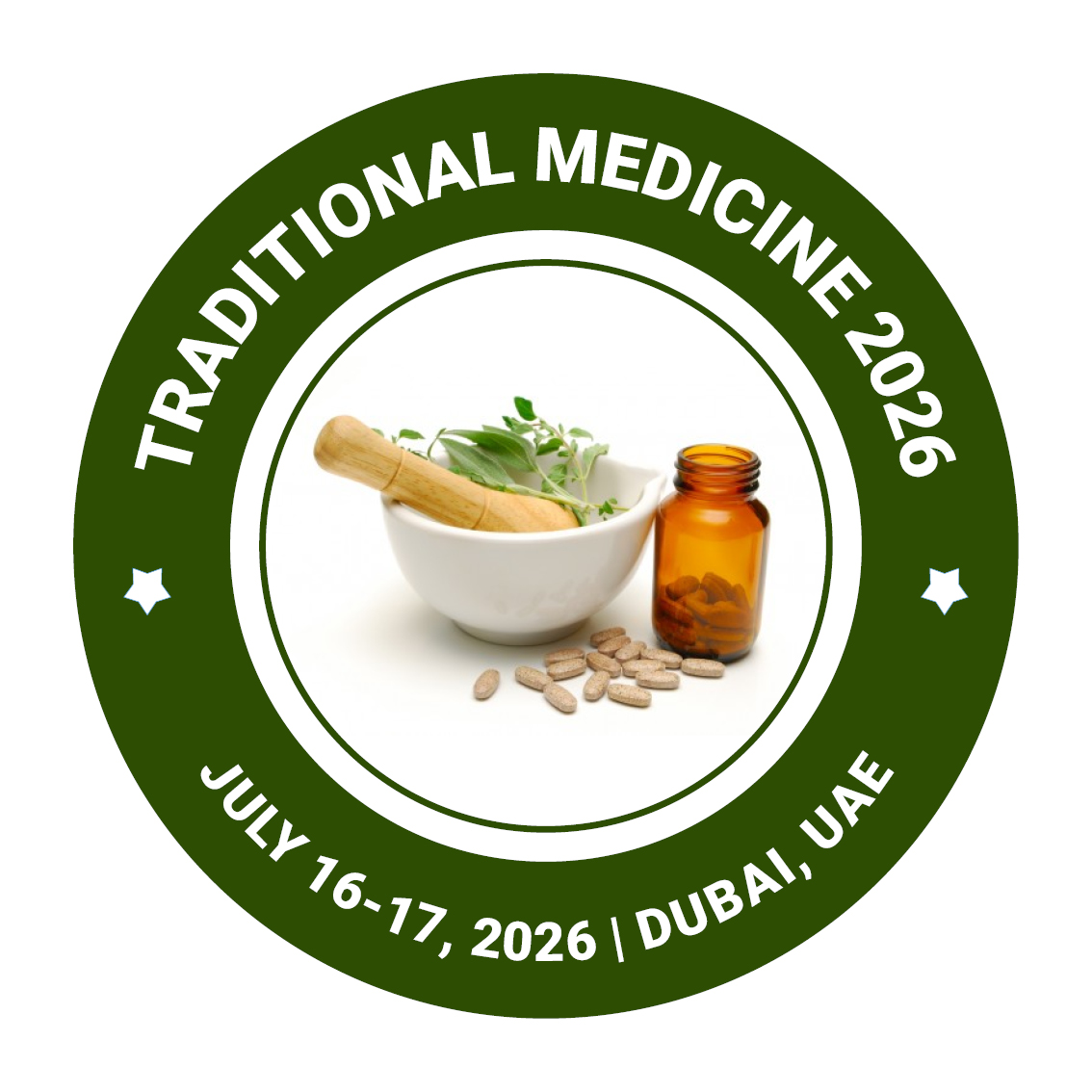Call for Abstract
Scientific Program
9th World Congress on Traditional and Complementary Medicine, will be organized around the theme “From Tradition to Innovation: Herbal Remedies in Modern Medicine”
TRADITIONAL MED MEET 2026 is comprised of keynote and speakers sessions on latest cutting edge research designed to offer comprehensive global discussions that address current issues in TRADITIONAL MED MEET 2026
Submit your abstract to any of the mentioned tracks.
Register now for the conference by choosing an appropriate package suitable to you.
Herbal medicine explores the healing power of plants and natural remedies. This track covers the role of herbs in preventing and treating diseases, their safety aspects, and their applications in modern medicine. Delegates will also gain insights into the latest research and how herbal medicine is becoming an essential part of global healthcare
Ayurveda and Siddha are ancient Indian systems of medicine that emphasize balance between body, mind, and spirit. This track highlights traditional healing methods, personalized care, and natural treatments that remain highly relevant today. Discussions will also show how these practices can integrate with modern healthcare approaches.
Homeopathy uses natural remedies in very small doses to stimulate the body’s self-healing power. This track discusses its role in managing both acute and chronic illnesses, research evidence, and safety standards. It will also explore how homeopathy complements modern medical practices.
Naturopathy promotes healing through natural methods such as diet, lifestyle changes, exercise, hydrotherapy, and detoxification. This track highlights how naturopathy supports preventive health, strengthens immunity, and helps manage chronic conditions by focusing on holistic well-being.
Unani medicine, rooted in Greek-Arabic traditions, emphasizes balancing the body’s natural elements. This track explores herbal treatments, diet therapy, and regimental practices, highlighting how Unani is effective in managing lifestyle-related diseases such as diabetes, obesity, and digestive disorders.
Traditional Chinese Medicine includes acupuncture, herbal therapies, tai chi, and qi gong. This track focuses on restoring balance and energy flow in the body. Sessions will highlight its role in pain relief, chronic illness management, and integrative healthcare supported by scientific evidence.
This track focuses on the traditional knowledge of indigenous communities and their use of plants for healing. Delegates will explore cultural practices, ethnobotanical studies, and the importance of preserving and validating this knowledge for modern medicine and biodiversity conservation.
Phytotherapy studies the medicinal value of plants and their natural compounds. This track highlights innovations in plant-based treatments, their use in functional foods and supplements, and the continued importance of medicinal plants in developing new drugs and therapies.
This track emphasizes the conservation of medicinal plants and natural resources. Key topics include sustainable farming, responsible harvesting, and global strategies to protect biodiversity. Delegates will learn how to balance the growing demand for natural remedies with the preservation of ecosystems.
This track covers international policies, safety standards, and quality regulations in traditional medicine. It will provide insights into global efforts to harmonize practices, ensure patient safety, and responsibly integrate traditional medicine into modern healthcare systems.
Integrative oncology combines modern cancer treatments with supportive therapies such as acupuncture, herbal medicine, and nutrition. This track explores how integrative approaches reduce side effects, improve quality of life, and support patient recovery during and after cancer treatment.
Medicinal mushrooms are widely recognized for their ability to boost immunity and fight disease. This track explores their role in cancer care, infections, and functional foods. Discussions will highlight active compounds like beta-glucans and their potential applications in modern medicine and nutrition.
Yoga, meditation, and mindfulness practices are powerful tools for stress reduction, mental health, and physical well-being. This track highlights the clinical benefits of mind-body therapies and how they are increasingly adopted in hospitals and global healthcare systems.
Energy healing practices such as Reiki, pranic healing, and bio field therapies are gaining popularity worldwide. This track discusses their role in stress relief, emotional balance, and complementary healthcare, focusing on their ability to support overall well-being alongside conventional treatments
Aromatherapy uses essential oils for relaxation, pain relief, and improved sleep. This track highlights the healing properties, safety, and clinical applications of essential oils. Delegates will also explore how aromatherapy is used in both healthcare and wellness settings worldwide.
This track explores nutraceuticals and functional foods enriched with vitamins, minerals, and bioactive compounds that prevent disease and promote health. Delegates will learn about new scientific research, regulatory frameworks, and how nutraceuticals are shaping the future of preventive healthcare.
Acupuncture is one of the most widely accepted complementary therapies for managing pain. This track highlights its effectiveness in treating chronic pain, arthritis, and neurological disorders. Sessions will focus on evidence-based approaches and its integration into mainstream healthcare.
This track examines how complementary medicine contributes to preventive care and community health. Discussions will include wellness strategies, global health policies, and how traditional and modern practices can be combined to promote healthier populations worldwide.
Digital tools such as apps, telemedicine, and wearable devices are transforming healthcare delivery. This track highlights how technology is improving access, personalizing care, and supporting the integration of complementary medicine into modern healthcare systems.
This track covers therapies such as mindfulness, art therapy, and music therapy for addressing stress, anxiety, and depression. Delegates will explore how complementary practices support mental well-being and are becoming more widely accepted in global mental healthcare.

